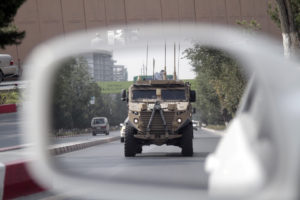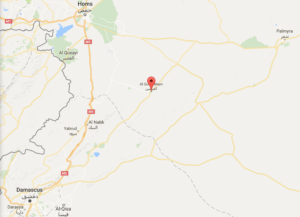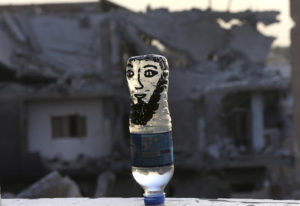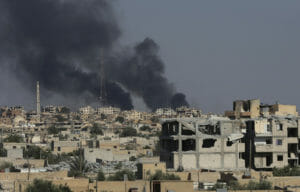U.S. Seeks to Prevent Islamic State From Looting, Selling or Destroying Antiquities
A meeting was convened recently in Washington, D.C., to discuss how to secure and preserve cultural artifacts in the Middle East.
The Temple of Bel before it was razed by Islamic State. (Bernard Gagnon)
Islamic State’s operations involve more than murder, mayhem and destruction of valuable artifacts in the Middle East. The group is also profiting from looted antiquities.
United States officials are redoubling their efforts to protect ancient works of art. In a congressional briefing in Washington, D.C., on Sept. 8, professors and government representatives including State Department officials gathered to discuss the security of Middle East antiquities. While Islamic State is known to destroy large cultural antiquities to attract media attention (such as the public destruction of the Temple of Bel in Syria), the group also engages in the trafficking of antiquities to fund its operations.
Stopping the problem has been a challenge.
From The New York Times in January:
The police raid [in Shumen, Bulgaria,] last March [2015] was heralded as a rare success against the trafficking of antiquities, a crime that reached new levels as the Islamic State militant group took control of parts of Syria and Iraq, and destroyed and looted ancient sites. Yet it also highlighted the barriers that, dozens of art experts and officials in the United States and Europe say, hamper the fight against the illicit trade.
Laws around the world are weak and inconsistent, and customs enforcement can screen only a portion of what crosses international borders, according to officials and experts in trafficking. Long-established smuggling organizations are practiced in getting the goods to people willing to pay for them, and patient enough to stash ancient artifacts in warehouses until scrutiny dies down. Despite a near-universal outcry over Islamic State’s actions, few countries have shown interest in imposing new restrictions to curb the booming trade in antiquities, estimated to be worth billions of dollars a year.
“It’s a broken system that ISIS or anyone else, whoever is next, can play into,” said Donna Yates, an archaeologist at The Scottish Centre for Crime & Justice Research at the University of Glasgow.
Officials still do not know how the artifacts ended up in Shumen or whether they passed through Islamic State territory. For every seizure like the one here, many other pieces are believed to reach dealers and buyers in Vienna, Munich, London and New York. Dealers exploit the legal trade in antiquities to move objects that have been looted for years amid the conflicts in Syria and Iraq, as well as Libya, Yemen and Egypt, officials and experts said.
The sale of heritage objects has sparked renewed interest among U.S. national security officials because the funds from stolen antiquities help fuel Islamic State’s capacity for violence. The artifacts can generate sizable revenues, estimated at $150 million to $200 million per year.
The U.S. Department of State reported in May 2015 that “U.S. Special Forces raided the Syrian compound of Abu Sayyaf, the head of ISIL’s oil and gas, and antiquities division” and discovered hundreds of historical artifacts. Documents found in the raid confirmed Islamic State’s large profit from theft.
Stephen Epstein, special adviser to the State Department’s Bureau of Near Eastern Affairs, expressed his concerns at the congressional briefing: “Documents captured by the raid showed that Daesh [Islamic State] has elaborate bureaucracy devoted to the administration of the sale of antiquities. … The artifacts looted from Syria and Iraq have not immediately flooded the art market. Some have trickled onto the market, but most—especially the most costly pieces—have been warehoused awaiting a more propitious market environment.”
In addition to focusing on Islamic State’s financial strategy, U.S. officials are concerned with the preservation of cultural items. Corine Wegener, cultural heritage preservation officer at the Smithsonian Institution, spoke at the meeting about the importance of recovering Middle Eastern antiquities, noting that displaced populations will eventually return to territories now controlled by Islamic State. “People need something to return to someday … ,” she said. “After you save people’s lives, you have to save people’s reason for living.”
—Posted by Clara Romeo
Independent journalism is under threat and overshadowed by heavily funded mainstream media.
You can help level the playing field. Become a member.
Your tax-deductible contribution keeps us digging beneath the headlines to give you thought-provoking, investigative reporting and analysis that unearths what's really happening- without compromise.
Give today to support our courageous, independent journalists.




You need to be a supporter to comment.
There are currently no responses to this article.
Be the first to respond.